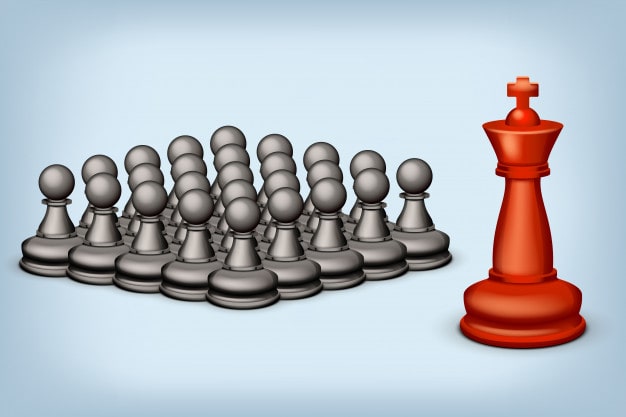
Understanding the Various Sources of Power in Leadership

Leaders use different types of power to influence employees' attitudes, values, and behaviors to achieve organizational goals These include legitimate, reward, coercive, informational, expert, referent, and connection power Understanding the roles of power in leadership is crucial for effective leadership and organizational success
Leaders in organizations utilize various types of power to impact the attitudes, values, and behaviors of employees in order to achieve the organization's objectives. The intention of this managerial power is to either incentivize certain actions or discourage undesirable behaviors. As a result, a successful leader is driven by energy that brings about positive outcomes in a seamless manner.
Effective leaders possess certain types of power that require a great deal of dedication and firmness. The energy needed to wield this power is immense, and it is important to question oneself if they are up for the challenge. In 1959, social psychologists John French and Bertram Raven identified the five main elements that contribute to effective leadership.
The research discovered by the duo is still relevant to modern-day leaders and serves as an essential lesson in management programs. The ability to coordinate, tolerate, and foster teamwork are crucial components of any company or organization. These elements stem from the various forms of power that exist. In recent times, the five categorized powers have been further developed and now constitute seven distinct types. Let us delve into what these powers are.
7 types of power
Before classifying their five types of Power, Raven and French divided each of them into two groups, i.e., Positional and personal.
Learning the bases is to be a better influencing leader that also knows what types of power sustain a positive and negative instance.
A. Positional Power Sources
1. Legitimate Power
Leaders in positions of power, such as political heads, CEOs, and religious leaders, hold significant influence over their respective communities. This power is often viewed as uncertain, given that it is tied to their position rather than their personal qualities.
This type of power is limited to the formal hierarchy of the organization and does not extend beyond it. For instance, if you hold the position of CEO in a company, your authority is confined to the organizational structure. If one of your employees decides to leave, your power over them diminishes and they may no longer feel compelled to comply with your directives as they did before. Essentially, this kind of power is based on position and title and is enforced through obligation rather than genuine respect or admiration.
2. Reward Power
Promotions, duties, appreciations, and everything in the linear line are channeled with the reward types of power.
The body's influence over your tasks can motivate you to strive for excellence in order to receive positive feedback.
Nevertheless, it is uncommon for someone with reward power to delegate tasks in such a manner. Neither the CEO nor the managers possess the authority to immediately increase your status or salary.
Leaders can exert influence over their subordinates by controlling access to valuable resources, a strategy commonly known as reward power. Such leaders frequently reward their followers with bonuses, promotions, and other incentives for exceptional performance. This approach often results in a reciprocal relationship, as subordinates may then express their gratitude through loyalty and admiration towards their leaders.
3. Coercive Power
Very much known for the resentment of people who are hit with this Power is Coercive.
The depressing section of the coercive power types is the unpleasant threat that goes by until a punishment.
Have you ever been through a threat about losing a job or deprived of certain benefits?
Well, that is the coercive power you faced.
Perhaps your leader has a valid reason for their actions. It's possible that there are areas where you could improve, but you may not have been aware of them.
While it's important for leaders to provide guidance and lessons, relying too heavily on coercive power can create opposition within the team. Additionally, excessive use of this power can lead to accusations of bullying.
Leaders who wield coercive power rely on negative reinforcement to encourage subordinates to abstain from undesirable behaviors or attitudes. This type of power instills fear or the threat of loss, whether through formal sanctions or informal warnings. Formal coercive power may involve disciplinary write-ups, while informal coercive power can include off-the-record warnings.
4. Informational Power
A substantial information colleague that needs to be used is quiet on the top with an informational power.
Rewritten: A prime illustration of such power can be observed in individuals who handle private financial documents, serve as unofficial recorders without any remuneration, or oversee private plans. These individuals possess a crucial element that is highly valued.
The power comes with the ability to disclose confidential information on time and manipulate it and not by the actual information- be it small or big.
B. Personal Power Sources
5. Expert Power
To wield such potent forms of power, you must possess the ability to comprehend complex issues and devise effective solutions to resolve them.
To cultivate this skill within yourself, you must sharpen your reasoning abilities and immerse yourself in the process of making sound judgments.
When you deliver effective messages that challenge the power of others, you can attract a loyal audience that respects and follows your guidance. Providing accurate assessments of situations gives people a reason to trust and seek your counsel in the future. This helps to enhance your reputation and credibility over time.
Expert Power is a form of power that is obtained through possessing a significant amount of knowledge or skill in a specific field. This type of power can be acquired by both leaders and followers, and can be exercised by them as well.
6. Referent Power
Celebrities possess a wide range of influential powers. They can captivate and sway a massive audience with just one action or statement. Whether it's fashion, food, or social activities, they have the ability to captivate you in any area, even those you previously had no interest in.
Celebrities and influencers wield significant referent power, which helps them reach great heights. Their ability to inspire a positive outlook in their audience is evident in every post on Instagram. However, this power comes with a weighty responsibility that is often overlooked by the audience.
Dishonesty is frequently used as a means to avoid responsibility and gain power, resulting in false cases that are more appealing and garner more attention. Leaders often combine referent and expert power to increase their influence and following. The greater the leader's expert power, the more likely they are to be recognized for their referent power and attract more followers.
This type of power is derived from the strength of interpersonal relationships. It is earned by meeting specific interpersonal needs. Referent power is relational.
7. Connection Power
Having connection power means that you possess the ability to establish valuable relationships with influential officials, whereas referent power is all about being well-liked by others.
Here is a video byon Types of Power.
Roles of Power in Leadership
Regardless of the level of power, leadership is guided by the same principles. In our professional lives, we rely on a leader at the helm to guide us through projects and challenges. However, have you ever wondered what would happen if this leader suddenly lost their power?
It can be quite daunting to think about. However, as leaders, we should approach the task at hand with confidence and view it as a challenge to be overcome. Instead of letting fear hold us back, we should focus on how to handle the situation, where to begin, what actions to take, and when to execute them.
But what sounds scary is the straying of knowledge on where to begin.
The leader allows the team with subjects to look upon and anything else, without which there’s no start and no implementation.
Having leadership skills and powers is a trait possessed by every individual. The responsibility to utilize them effectively lies solely on us. These skills and powers pave the way for job opportunities and open doors to various fields.
Effective leaders are those who possess self-awareness and do not imitate others. They carve their own path and stay true to their unique ideas. Innovation is a crucial aspect of their leadership style.
A strong leader is often characterized by their ability to maintain a non-egoistic attitude, adaptability, and a commitment to upholding standards. These qualities are not only fundamental to being a good human being, but also essential to effective leadership. However, despite being intrinsic to one's character, these traits are often overlooked when selecting leaders.
Understanding the different types of power and how to implement them effectively is also a crucial aspect of leadership. It is imperative to possess this knowledge in order to achieve the best possible results.
:
Motivation is a critical factor for success, yet it is often overlooked or handled poorly. It can be likened to grease that helps the wheels turn smoothly. While a team can collectively motivate each other, the true power lies in the hands of the individual leaders.
Leadership holds a significant role in the political arena as it ensures order and stability. Without strong leaders, a state would descend into chaos and disorder. However, it is important to note that power can also be a breeding ground for corruption if not kept in check.
Leadership is the key to maintaining order and preventing chaos in all aspects of life, whether it be in the classroom, home, office, or sports. This power is essential in creating a semblance of structure and ensuring that mess is kept at bay. However, despite the importance of this intrinsic power, it is often underutilized and overlooked.
How influential do you find the types of power mentioned above?
Which one do you consider the most effective one in channelizing the favorable outcomes?
Share your views with us in the comment section below.















